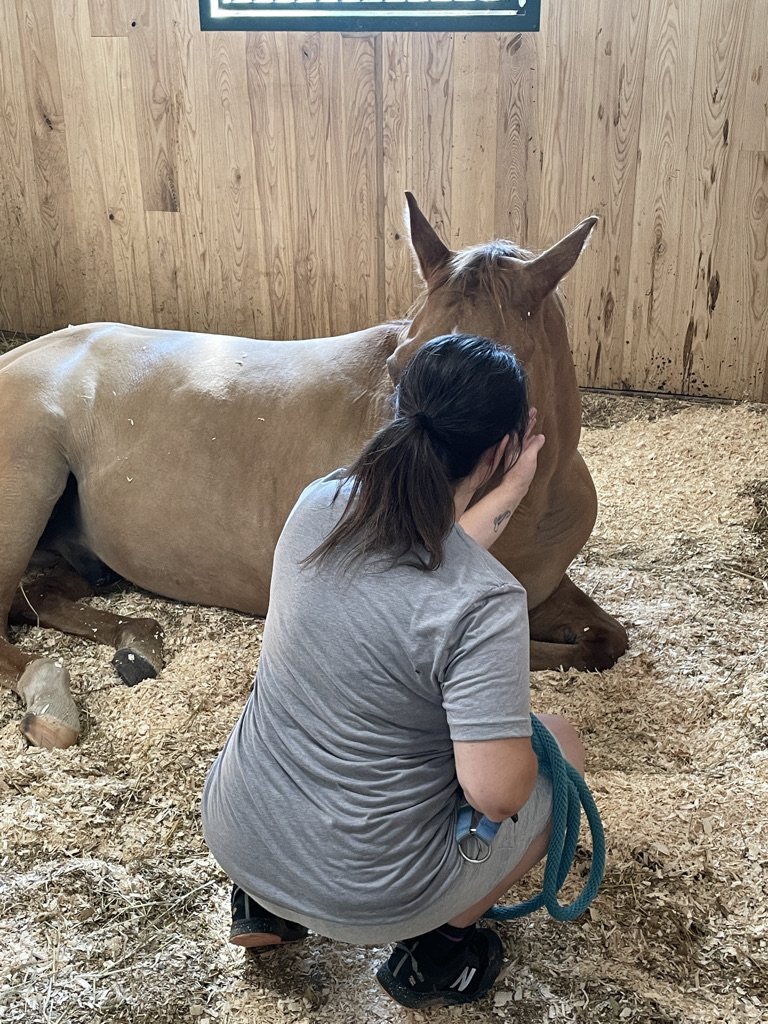A First Responder's Story
First-of-its-kind Canadian study looked at how horses can help first responders heal.
Nathalie Tuttle, a paramedic talks about her experience.
One of the study’s participants was Nathalie Tuttle, a paramedic who has been in the job for 18 years. Tuttle was diagnosed with PTSD, anxiety, and mild depression at the end of 2020. “I had symptoms for a long time before being diagnosed. I was in denial and pretended I was happy. I was pulling away from family and friends,” Tuttle admits. “I was angry and couldn’t control my emotions. I had insomnia, nightmares, flashbacks and was tired all the time.”
The result of these symptoms was to block and numb her feelings. She also had issues with her short-term memory and retaining information. “I couldn’t enjoy reading books anymore. I didn’t remember having conversations with people and would have them repeat what they had just said,” she explains. “It never affected my patient care at work, but my family didn’t recognize who I was anymore.”
Tuttle was told of the study and equine-assisted therapy by her therapist. She had always loved horses but had no prior experience with them. Despite her love of horses, Tuttle found the first couple of sessions challenging. “I was anxious and having trust issues which made me very anxious being close to horses, so I didn’t go near them. I was intimidated by them; they were so big up close,” she admits.
But on her third session, she worked with a horse named George and connected with him right away. “He kept me calm, made me realize I could now control my anxiety and I could trust again. From there on, I was looking forward every week to go to equine therapy and work with the horses.”
Tuttle said that during the program all of her symptoms started to improve. She became more confident, gained trust in herself and others and learned how to control her anxiety. “My memory improved, and I was able to read books again and not having people repeat themselves as much. I was sleeping better with less nightmares and flashbacks,” she explains. “I wasn’t numbing my feelings anymore. I got closer to my family and friends and stopped pushing them away. I was more patient and not angry all the time. I was happy and more positive.”
Tuttle wasn’t the only one who noticed the transformation. Her family also saw a difference and they were happy to see the positive changes. “I was also happy as to who I was becoming and didn’t want to go back to who I had become as a person before my diagnosis,” she adds.
Tuttle has returned to work full-time and while there have been challenges, she’s been able to manage them. “I am more positive and feel more present in my family’s life, I don’t push people away anymore,” she says. “To feel my feelings instead of numbing them has made a big difference in my recovery. I am very grateful for the horses for helping me control my emotions and also to help me feel my emotions.”
Tuttle loved being around horses so much she began leasing a horse named Anch last fall and has since become co-owner. “So, I still get to work with horses and I’m still learning every day. I now share my passion for horses with my mother and daughter.”
As for other first responders who want to continue with horses beyond the initial program, there currently isn’t a second tier to the program but that’s something Belvoir’s Lawrence hopes will change.
“The challenge is to find funding to help those who wish to continue. Equine therapy still does not get the recognition it deserves,” she says. “I do hope that the results of this research pilot will help. At this point the PTSD Association of Canada, which I founded in 2006, will conduct fundraisers to help fund the eight-week program for first responders and emergency workers.”
